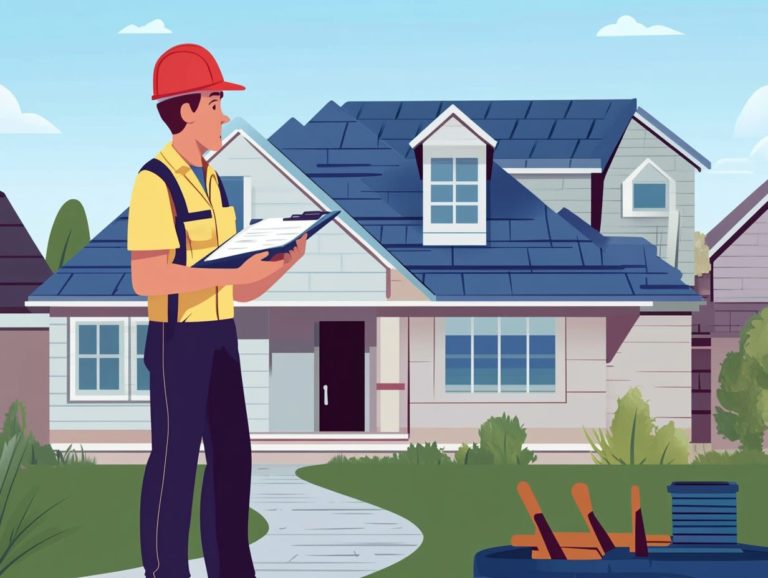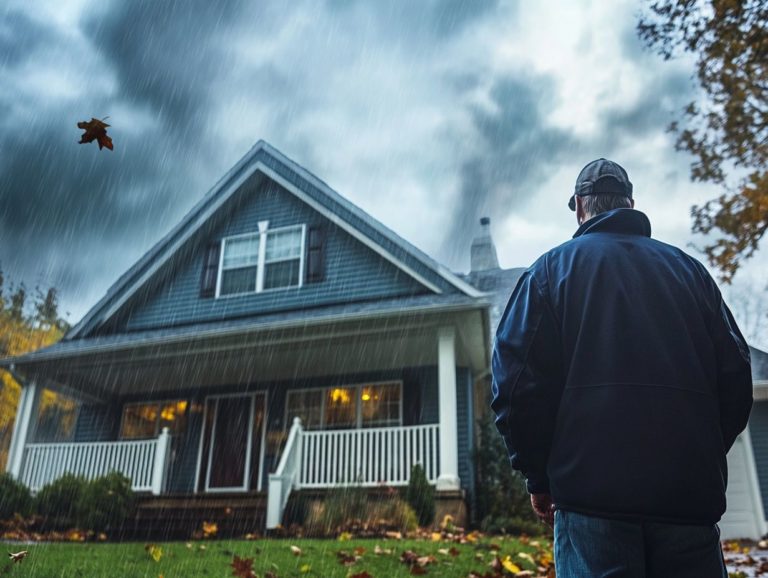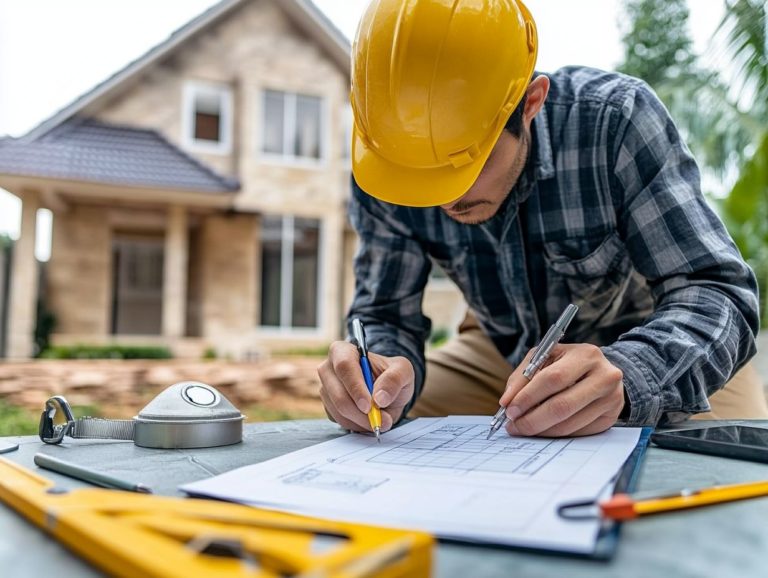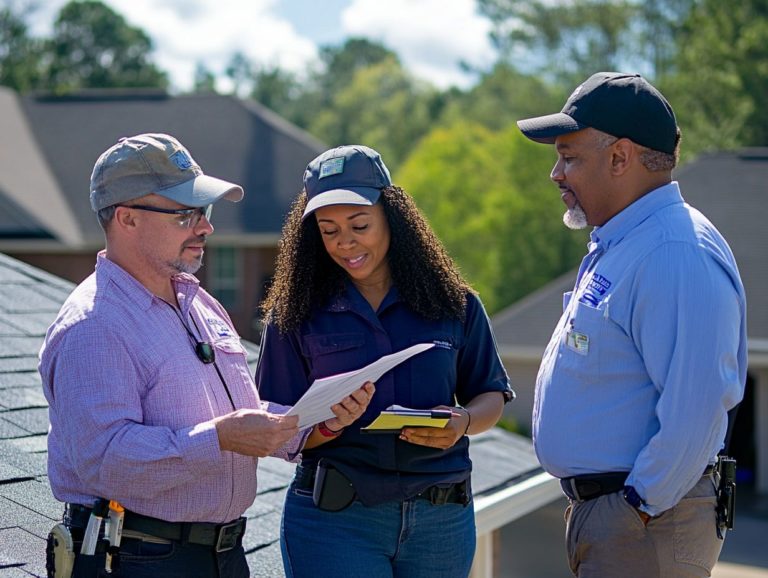Understanding the Home Inspection Process for Sellers
Selling your home can be an exhilarating yet intimidating endeavor. One pivotal step in this journey is the home inspection.
This guide is designed to help you navigate the home inspection process with ease and confidence. You ll gain a clear understanding of what a home inspection entails and its significance, along with the benefits it offers you as a seller.
We will cover essential steps to prepare for the inspection, what you can expect during the process, and how to effectively address any issues that may arise.
With practical tips to ensure a seamless inspection, you ll be empowered to make informed decisions and enhance your selling experience. Let s delve into how a thorough home inspection can set the stage for a successful sale.
Contents
- Key Takeaways:
- What is a Home Inspection?
- Why Sellers Should Consider a Home Inspection
- Preparing for a Home Inspection
- The Home Inspection Process
- Addressing Issues Found During the Inspection
- Tips for a Successful Home Inspection
- How to Ensure a Smooth Inspection Process
- Frequently Asked Questions
- What is the purpose of a home inspection for sellers?
- Who pays for the home inspection in the selling process?
- What does the home inspection process involve for sellers?
- What are some common issues found during a home inspection for sellers?
- Should sellers fix all issues found during the home inspection?
- Can a home inspection affect the sale of a property?
Key Takeaways:

- A home inspection is a thorough assessment of a property’s condition and is an important step for sellers to consider before listing their home on the market.
- Sellers can benefit from a home inspection by identifying any potential issues beforehand, gaining leverage in negotiations with buyers, and avoiding any surprises during the closing process.
- To prepare for a home inspection, sellers should declutter, make necessary repairs, gather important documents, and be present during the inspection to answer any questions or provide necessary information.
What is a Home Inspection?
A home inspection is an in-depth assessment designed to evaluate the overall condition of a property. It focuses on crucial elements like structural integrity, electrical systems, plumbing, and heating, ventilation, and air conditioning (HVAC) systems.
This process is important for both buyers and sellers. Carried out by licensed professionals, home inspections seek to uncover safety concerns and significant issues. Understanding the home inspector’s role can provide a comprehensive report detailing the property’s condition and potential risks.
This invaluable information gives buyers the power to make informed decisions, ensuring they re well-equipped for their investment.
Definition and Purpose
The purpose of a home inspection is to provide you with a comprehensive evaluation of a property. This ensures that you understand its condition before making a commitment to purchase.
This vital step in the home buying process reveals hidden issues, such as structural flaws or electrical problems, and equips you with the knowledge necessary to make informed decisions.
For sellers, a home inspection can be equally beneficial. It allows them to tackle repairs in advance and enhance their property’s market value, as outlined in understanding the importance of home inspections.
Ultimately, home inspections foster transparency and build trust, acting as a bridge between buyers and sellers. This process reduces risks and leads to smoother transactions.
Securing a professional inspection can significantly strengthen your position during negotiations.
Why Sellers Should Consider a Home Inspection
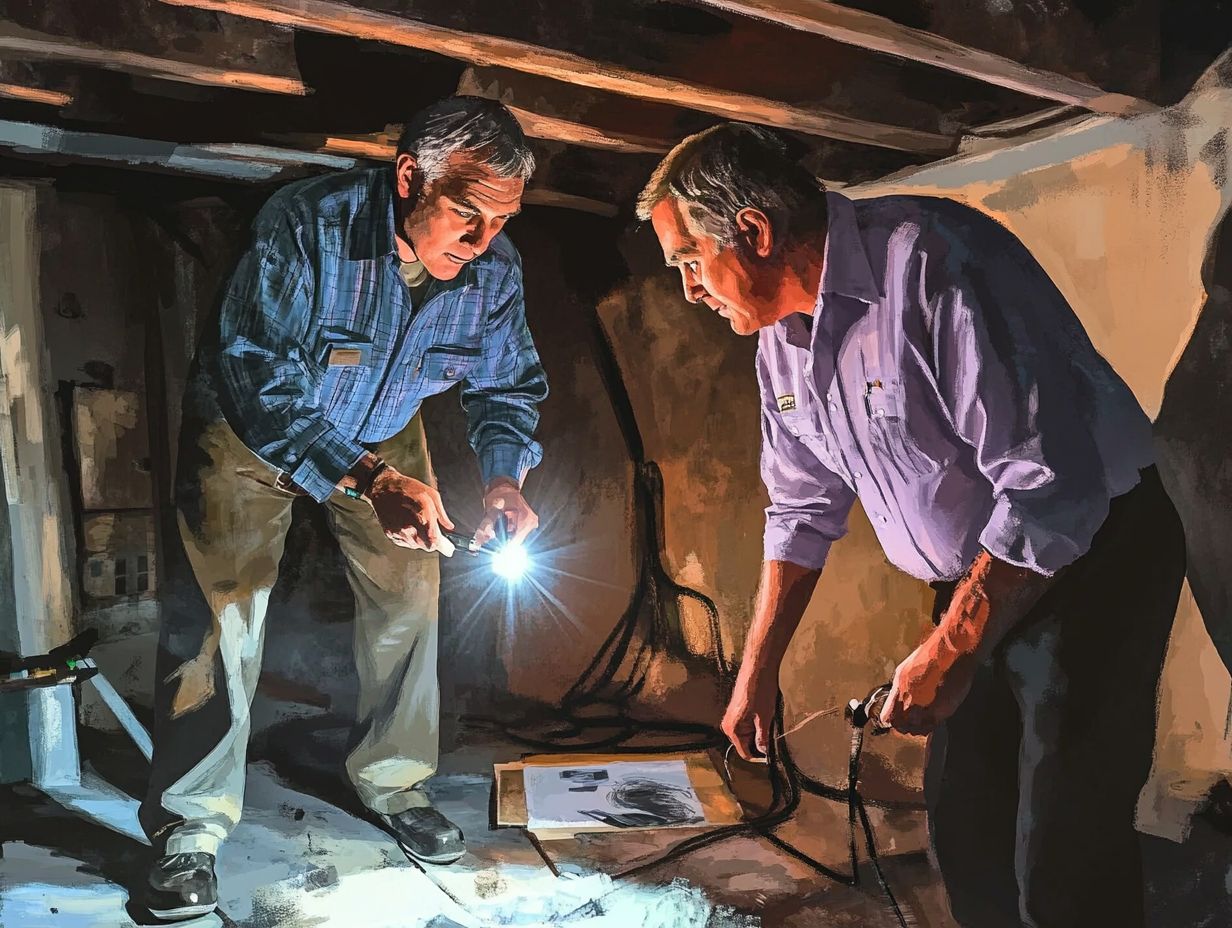
Don’t miss the chance to get a home inspection! It allows you to pinpoint any potential issues with your property.
This proactive step enhances your selling position and provides a transparent home inspection report to potential buyers.
This builds trust and speeds up the selling process.
Benefits for Sellers
The benefits of a home inspection for you as a seller are substantial. It allows you to uncover major issues before an appraisal, giving you the chance to address concerns proactively and negotiate more favorable terms with potential buyers. To learn more about this process, refer to the details in understanding the home inspection timeline.
By identifying and remedying issues ahead of time, you can significantly enhance your property’s marketability, making it more appealing to prospective buyers.
Addressing the findings from an inspection could lead to price adjustments that accurately reflect the true condition of your home, ensuring you don t leave any money on the table.
A pre-listing inspection can also elevate your credibility as a seller. It demonstrates transparency and a commitment to maintaining your home s value.
This level of honesty fosters trust, encouraging buyers to move forward with greater confidence and potentially speeding up the selling process.
Act now to uncover potential issues! Get your home inspected today and take the first step toward a successful sale!
Preparing for a Home Inspection
Preparing for a home inspection is essential for you as a seller. It involves a careful check of your home using an inspection checklist to pinpoint and address any potential issues. To learn more about this, consider understanding the process of home inspections.
This way, you can showcase a well-maintained home while also gaining a clear understanding of the costs associated with the inspection process. Get started on your home preparation today!
Steps to Take Before the Inspection
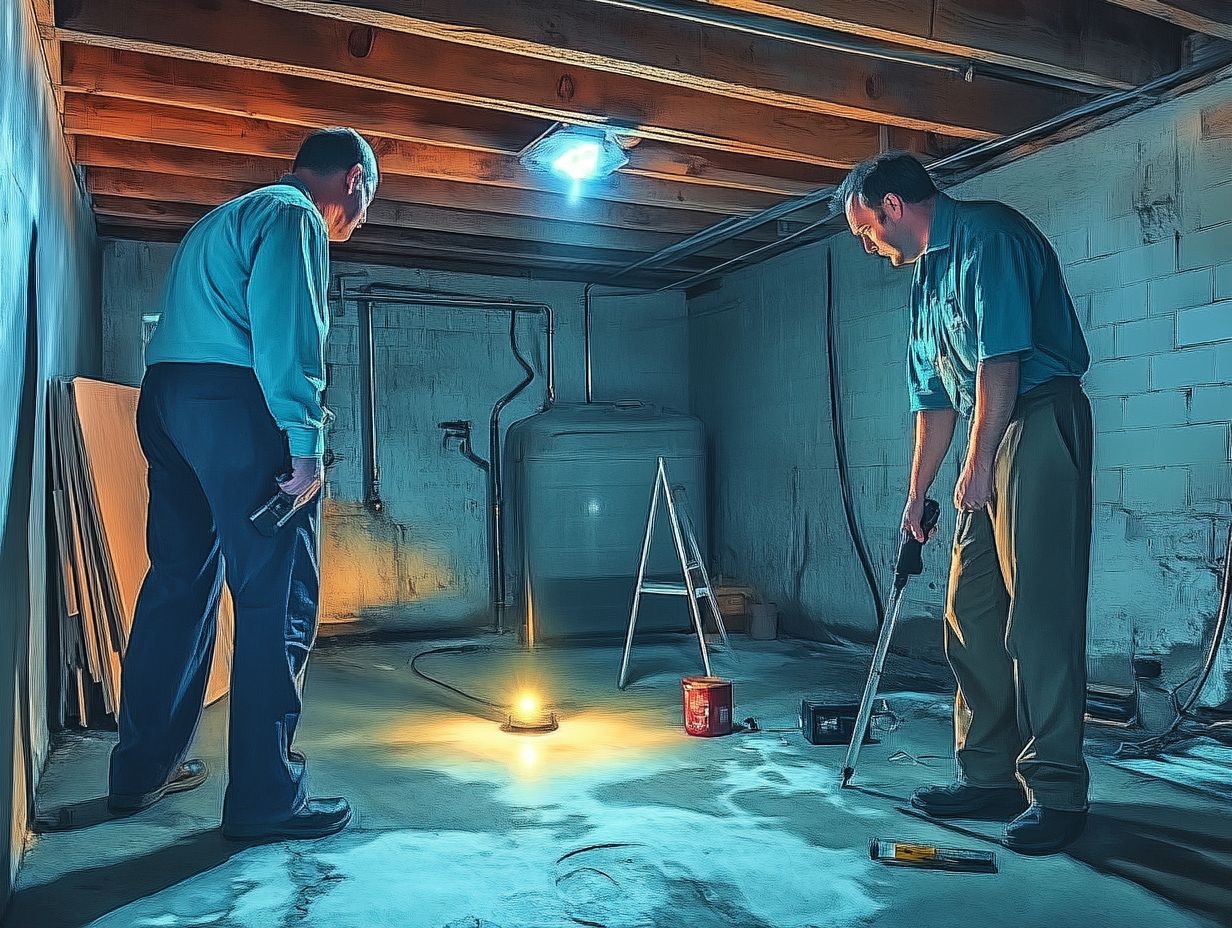
Before your home inspection, it s time to take crucial steps now. Start by addressing any obvious repairs and giving your home a thorough cleaning. Ensure all areas are accessible to the inspector. These actions can significantly impact the outcome of the inspection checklist.
To maximize the effectiveness of the inspection process, it s wise to tackle any safety concerns. Check for loose railings or faulty smoke detectors, as these issues can deter potential buyers. Ensure that all appliances work properly; non-functional items can raise red flags during the assessment.
Consider consulting a skilled real estate agent who can provide tailored advice based on your local market. They can help you understand what potential buyers are most concerned about. By taking these proactive measures, you can expedite the selling process and enhance your property s appeal.
The Home Inspection Process
The home inspection process requires a thorough examination of the property’s structural components, systems, and overall integrity on the day of inspection. The inspector provides a detailed home inspection report, highlighting any safety concerns or necessary repairs.
This information can really help you and the buyers navigate the next steps with confidence.
What to Expect During the Inspection
During the home inspection, expect the inspector to evaluate critical components, including heating, ventilation, and air conditioning (HVAC) systems, plumbing, electrical systems, and structural integrity. You ll receive a detailed overview of any existing issues.
This comprehensive assessment typically begins with a thorough examination of the roof and foundation, as these elements are essential to the overall stability of the property.
Inspectors check for signs of water damage or structural deficiencies, which could signal deeper problems. While inspecting the plumbing, they ll look for leaks, corrosion, and proper drainage, and they will focus on safety, code compliance, and functionality when evaluating the electrical system.
Understanding these findings can significantly influence your negotiating terms, as potential repairs may need to be tackled before closing. The inspector’s insights not only inform you but also empower you to make sound decisions regarding the future of the property.
Addressing Issues Found During the Inspection
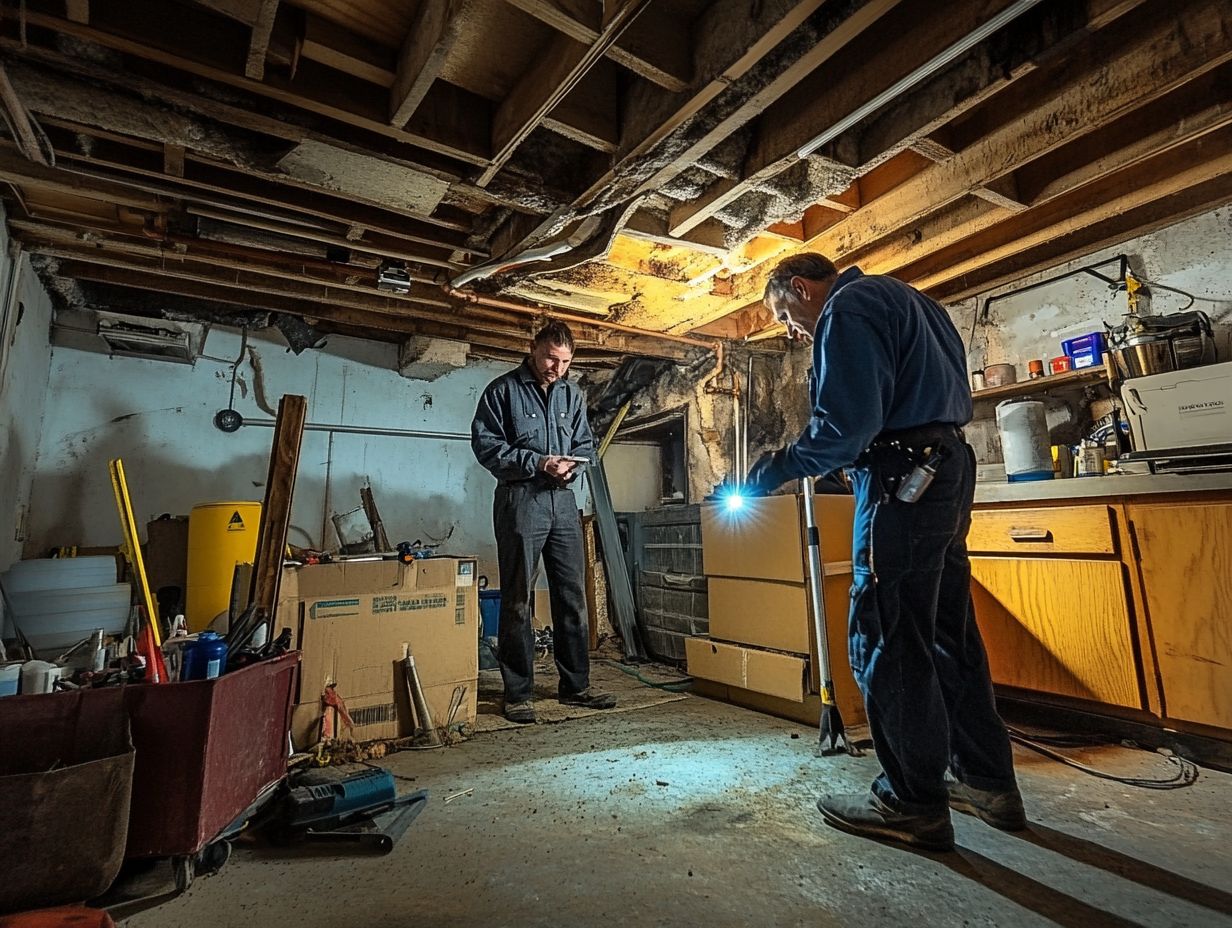
Addressing the issues identified during the home inspection is essential for you as a seller. The information from the home inspection report can significantly influence your negotiations with buyers and help you determine which repairs should take precedence before finalizing the sale.
Negotiating with Buyers and Making Repairs
Navigating negotiations with buyers after a home inspection can be daunting. However, by thoroughly understanding the home inspection report and identifying which repairs are necessary, you can steer the discussions toward outcomes that satisfy both parties.
To make this process smoother, spotlight the most pressing issues while remaining transparent about your own viewpoint. A strategic mindset means weighing different repair options, ranging from minor fixes to possible concessions, which can foster goodwill.
Involving experienced real estate agents can also enhance these negotiations; their expertise allows them to frame conversations positively and advocate effectively for your interests. By creating a collaborative atmosphere, both you and the buyers can explore solutions that address their concerns while paving the way for a successful transaction.
Tips for a Successful Home Inspection
To ensure a successful home inspection, embrace key strategies. Be transparent about the property’s condition honesty is the best policy.
Prepare thoroughly by using a comprehensive home inspection guide. Ensure your home is clean and accessible for the inspectors. This thoughtful approach will enhance the inspection experience and reflect positively on your commitment to the property.
How to Ensure a Smooth Inspection Process
Prioritize effective communication with the inspector. This dialogue is vital for addressing any concerns or safety issues that may arise during the evaluation.
You can also enhance the experience by organizing all important papers in advance. Have records of prior repairs, warranties, and any relevant service contracts ready to go.
Being available for questions demonstrates your commitment and helps clarify any doubts the inspector or potential buyers might have. Keeping that communication line open encourages transparency, builds trust, and leads to a more positive and productive inspection outcome.
Frequently Asked Questions
What is the purpose of a home inspection for sellers?
The purpose of a home inspection for sellers is to identify potential issues with the property that could affect the sale. It allows sellers to address these issues before listing the house, preventing surprises during the home selling process.
Who pays for the home inspection in the selling process?
Typically, the buyer pays for the home inspection as part of their due diligence in the home buying process. However, in some cases, the seller may choose to cover the cost of the inspection to attract more potential buyers.
What does the home inspection process involve for sellers?
The home inspection process for sellers usually begins with hiring a professional home inspector. The inspector will examine the property, inside and out, looking for any potential issues. To better prepare for this step, it’s helpful to read up on understanding the home inspection process for sellers. They will then provide a detailed report outlining their findings and recommendations for repairs or maintenance.
What are some common issues found during a home inspection for sellers?
Some common issues that may be found during a home inspection for sellers include structural problems, electrical or plumbing issues, water damage, and pest infestations. Other areas evaluated may include the roof, HVAC system, and foundation.
Should sellers fix all issues found during the home inspection?
It is not necessary for sellers to fix every issue found during the home inspection. However, address major issues immediately to boost your home’s value! Sellers can also choose to negotiate with the buyer on repair costs or offer credits instead.
Can a home inspection affect the sale of a property?
Yes, a home inspection can affect the sale of a property. If major issues are found, the buyer may request repairs or credits, impacting the final sale price. Furthermore, if the inspection report raises red flags, it could deter potential buyers from making an offer.

